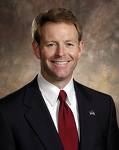 God-o-Meter doesn’t know how much stock to put in the opinions of religious/political/academic elites in judging how Mitt Romney fared in this morning’s “Faith in America” speech. After all, this is an instance in which only polls can truly tell if Romney changed minds about his candidacy, particularly among those 36-percent of evangelical Republicans who have misgivings about supporting a Mormon candidate.
God-o-Meter doesn’t know how much stock to put in the opinions of religious/political/academic elites in judging how Mitt Romney fared in this morning’s “Faith in America” speech. After all, this is an instance in which only polls can truly tell if Romney changed minds about his candidacy, particularly among those 36-percent of evangelical Republicans who have misgivings about supporting a Mormon candidate.
Still, God-o-Meter has been working the phones in religious/political/academic circles nonetheless. The early verdict is that Romney did about as well as he could have given that he is battling deep-seeded historical and religious forces as he tries to convince his party’s base–not to mention the rest of the country–to overcome their prejudices. Of most note to God-o-Meter was that Romney cut the evangelical speak and acknowledged that Mormonism is distinct from traditional Christianity:
My church’s beliefs about Christ may not all be the same as those of other faiths. Each religion has its own unique doctrines and history. These are not bases for criticism but rather a test of our tolerance. Religious tolerance would be a shallow principle indeed if it were reserved only for faiths with which we agree.
Did Romney delve into the nitty gritty of Mormon doctrine–or even the basics, for that matter? No. But Mormon scholar Richard Bushman, himself a Mormon who has criticized Romney for trying pass as a traditional Christian, says Romney’s speech struck a new, decidedly non-evangelical tone:
He used the word Mormon only once, but he also said that no one admired a religious of convenience. So in that sense he did distinguish himself briefly, only for a moment, but I though it was fairly effective. He put [his critics] in a corner by saying “If you cant’ tolerate Mormonism, than what does toleration mean?”
While it was lost on God-o-Meter’s ears, Bushman said that Romney’s speech even included decent-sized helping of “Mormon talk”:
I’m not a big one for thinking the country was founded on religion, but that’s how Mormons talk. His affirmation that he would not abandon his faith, that’s an ongoing Mormon issue, because we’re an isolated group and look a little weird and there’s such a temptation to trim your sails and look like the rest of the world. So the idea of “I’m a Mormon who stays true to my faith always resonates with Mormons.”
Evangelical activist and one-time presidential candidate Gary Bauer, meanwhile, says Romney’s few lines about Jesus would go over well with evangelicals:
If he would have said today that Mormons believe that Jesus is the son of God and path of salvation there would have been a lot of evangelicals who would have bristled at that, because it’s perceived that that’s not what Mormonism teaches. But in saying that he believes Jesus is the son of God will be reassuring to many of those voters.
Bauer added that, though he’s still got the most affinity for Fred Thompson, Romney’s many lines forcefully advocating for religion’s place in American politics and history will be a big hit with evangelicals:
I think secular voters might find the speech very offensive for the very reason that I and other evangelicals liked it, in the sense that he drew a very clear parallel between American liberty and the faith of the Founding Fathers.
Boston College religion scholar Alan Wolfe who, like Bushman, had discerned earlier attempts by Romney to come off as a traditional Christian, says the candidate today “hit a triple, if not a homerun”:
I was worried that Romney would say ‘I’m a born again Christian, too. But what he did instead was pick every single bullet point from the evangelical understanding of America’s civic religion, like that it was born out of religious conviction, and say it. And that is much more effective in trying to persuade evangelicals that he’s one of them.
According to Bushman, those bullet points also constitute “Mormon talk.” So God-o-Meter concludes that in genuinely articulating an orthodox Mormon view of government, Romney might have ended up striking a chord with some evangelicals. Still, GOM wants to see those polls.
6

